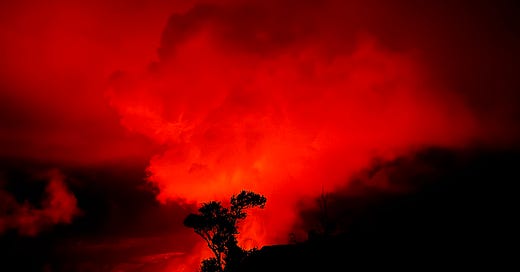You would have, too. From that distance the shivering city fit in the palm of her hand like she owned it. She could’ve blown the whole thing— markets, dancehalls, hookah bars— sent the city and its hundred harems tumbling across the desert like a kiss. She had to look back. When she did, she saw pigeons glinting like debris above ruined rooftops. Towers swaying. Women in broken skirts strewn along burned-out streets like busted red bells. The noise was something else— dogs wept, roosters howled, children and guitars popped like kernels of corn feeding the twisting blaze. She wondered had she unplugged the coffee pot? The iron? Was the oven off? Her husband uttered Keep going. Whispered Stay the course, or Baby, forget about it. She couldn’t. Now a bursting garden of fire the city bloomed to flame after flame like hot fruit in a persimmon orchard. Someone thirsty asked for water. Someone scared asked to pray. Her daughters or the crooked-legged angel, maybe. Dark thighs of smoke opened to the sky. She meant to look away, but the sting in her eyes, the taste devouring her tongue, and the neighbors begging her name. -Natalie Diaz, from When My Brother Was an Aztec, 2012
This is an intense poem. It’s hard to take in images like “children and guitars popped like kernels of corn” without a wave of nausea. The language pops and crackles like fire — blown, broken, busted, bursting, bloomed — and doesn’t let up.
The unexpected pairings of nouns and verbs are particularly arresting, combinations like pigeons glinting, dogs wept, roosters howled, guitars popped. The words are common, but they don’t usually belong together. It makes us pay attention to the horror of what’s happening.
This poem is a reinterpretation of the story of Lot’s wife from the Bible. In the story, Lot invites two messengers to stay the night at his home in the city of Sodom. When the men of the town discover he is harboring strangers, they demand that he turn them over to be, well, sodomized by the gathering crowd. Lot refuses.* The messengers turn out to be angels, and they help Lot and his family escape Sodom while God destroys the city as punishment. The angels warn the refugees not to look back, but Lot’s wife turns as they flee to see the city in flames. Instantly, she is transformed into a pillar of salt.
From the first line, Diaz brings the story closer to us — “Of course she looked back. You would have, too.” Lot’s wife isn’t remarkable, she is human. Just like you, just like me. When Diaz talks about gas and electricity and has Lot call his wife “baby,” she is telling us that this story is also the story of today. We are not finished watching places we belong to crumble.
Diaz is telling her own story here — as a Mojave-American linguist, she worked with the last elder Mojave speakers to preserve and revitalize the language. But with “You would have, too,” she’s also inviting us to think of the places we have left behind.
Lot’s wife has a sense that the she “owns” this city and is responsible for it in some way. And yet, she is fleeing. She has chosen to leave this place, but she is still called to it. She is stretched between wanting to serve and saving herself.
I have always wondered about the women in the story of Lot. They didn’t come to the door that night. We are told that Lot offered his two young daughters to the mob (they refused), but we know nothing about the rest of the women who lived and worked and danced in the city. This poem looks directly at these women, at the details of their lives and suffering, through the eyes of another woman who is herself suffering. They witness each other, and we witness them.
We know how the story of Lot ends, but we don’t know exactly what happens here. Something is burning, but perhaps something is also being birthed. There’s no resolution to the story, only the sounds of people crying for each other through the rubble.
Tumbling across the desert,
Jess




You are enriching my life in ways you can't even imagine. Thank you!